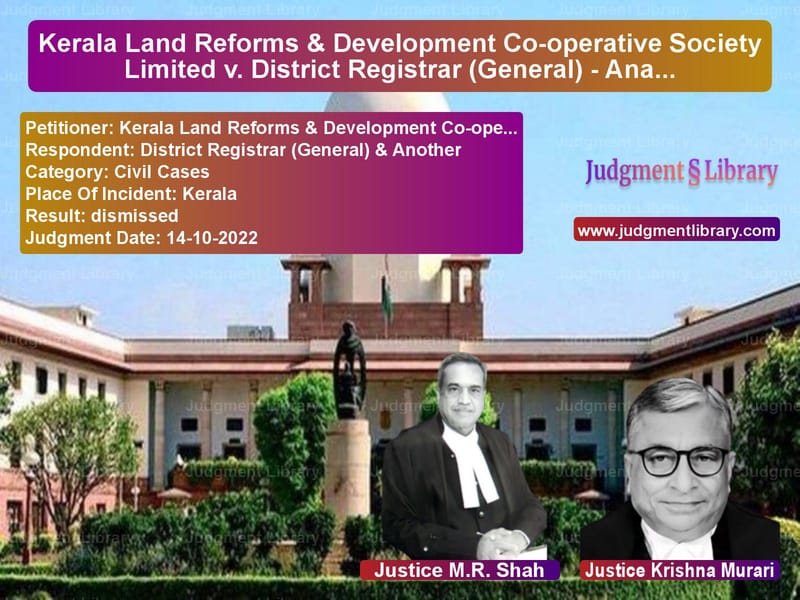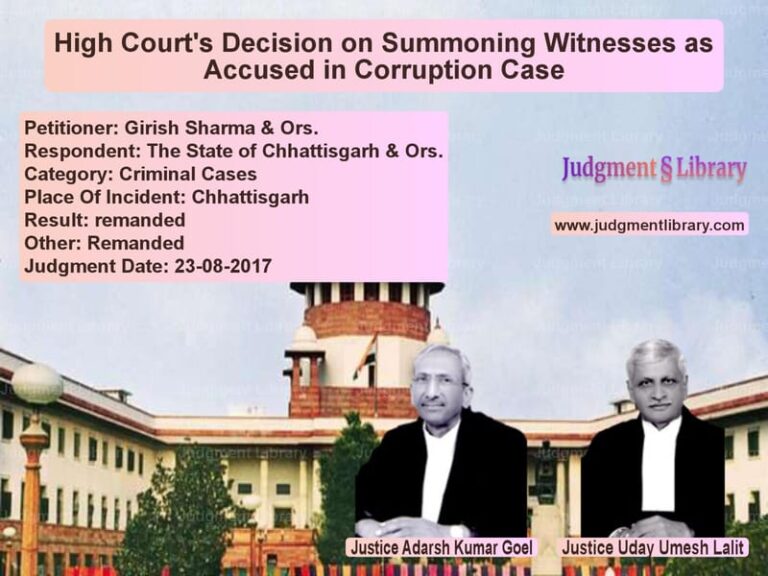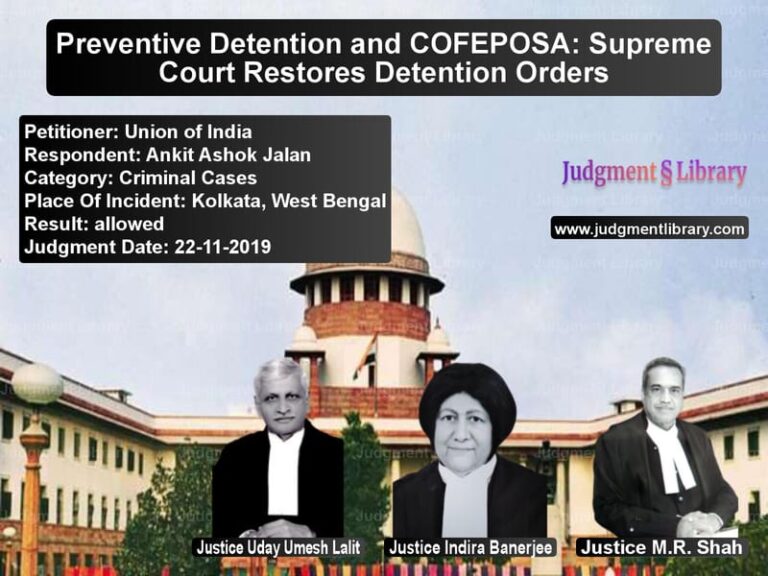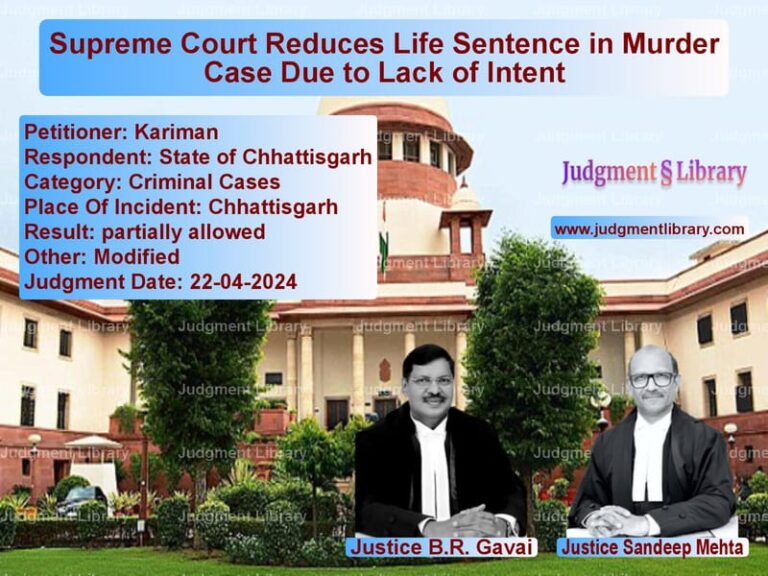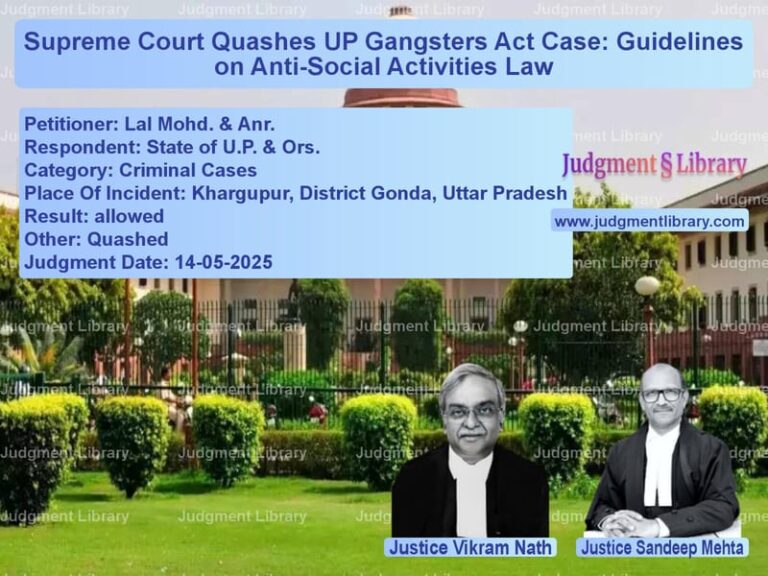Kerala Land Reforms & Development Co-operative Society Limited v. District Registrar (General) – Analysis on Stamp Duty Remission for Co-operative Societies
The case involves the Kerala Land Reforms & Development Co-operative Society Limited and other co-operative societies challenging the Full Bench decision of the High Court of Kerala. The primary issue was whether the societies were entitled to the benefit of remission of stamp duty on certain sale deeds executed by and for the societies. The appellant argued that under the Kerala Stamp Act, 1959, remission of stamp duty should apply to instruments executed by or on behalf of a co-operative society, as specified in the relevant provisions. However, the Full Bench of the High Court held that the remission of stamp duty could only apply in specific situations where the society, officer, or member would otherwise be liable to pay the duty, leading to the present appeal in the Supreme Court.
The dispute concerns whether the provisions of SRO No. 75/1960, issued under the repealed Travancore Co-operative Societies Act, 1951, continue to apply under the Kerala Co-operative Societies Act, 1969. The appellants argue that the remission of stamp duty granted under the earlier law should be saved under Section 110(2) of the Kerala Act, 1969. The respondents, on the other hand, contend that the remission provisions are inconsistent with the Kerala Act, 1969, and cannot be applied to the current sale deeds.
Petitioner and Respondent Arguments
Petitioner’s Arguments:
- The appellant, represented by learned Senior Advocate Shri Gopal Sankaranarayanan, argued that the remission of stamp duty on sale deeds executed by or on behalf of a co-operative society or its members is an established practice under the previous laws, including the Travancore and Madras Acts. The petitioner contended that even though these acts were repealed, the remission provisions were saved under Section 110(2) of the Kerala Act, 1969, and should apply to the sale deeds in question.
- The appellant also submitted that denying the remission of stamp duty on sale deeds executed by members of the society in favor of the society or vice versa would defeat the purpose of the remission scheme, which was designed to ease the financial burden on co-operatives.
Respondent’s Arguments:
- The respondent, represented by learned Senior Advocate Shri Jayanth Muthraj, argued that the provisions of SRO No. 75/1960 could not be applied under the Kerala Act, 1969. The respondent emphasized that Section 40 of the Kerala Act, 1969 specifically required that remission of stamp duty apply only when the society or member would have been liable to pay the duty, and not when such liability was absent, as in the case of the sale deeds executed by members in their individual capacity.
- Furthermore, the respondent contended that the remission provisions under SRO No. 75/1960 were inconsistent with the Kerala Act, 1969, particularly with respect to the execution of documents by members in their personal capacity or as guardians. They argued that the High Court’s decision to limit the remission only to cases where the society, officer, or member would otherwise be liable for the duty was correct.
Key Issues and Supreme Court’s Ruling
The Supreme Court focused on several key issues in the case:
1. Interpretation of Section 110(2) of the Kerala Act, 1969
The central issue in the case was whether the remission provisions under SRO No. 75/1960, issued under the Travancore and Madras Acts, were saved under Section 110(2) of the Kerala Act, 1969. The Court examined the arguments surrounding the saving clause in Section 110(2), which provides that the notifications and rules under the repealed acts should be deemed to have been issued under the Kerala Act, 1969, to the extent that they are not inconsistent with the provisions of the new law.
The Court ruled that the remission provisions of SRO No. 75/1960 could not be applied in this case because they were inconsistent with the provisions of Section 40 of the Kerala Act, 1969. Specifically, the Court found that Section 40(1)(a) of the Kerala Act, 1969 only allowed remission where the society, officer, or member would otherwise be liable to pay stamp duty. This interpretation led the Court to conclude that the provisions of the Kerala Act, 1969 took precedence over the earlier remission provisions.
2. Scope of Remission of Stamp Duty
The Court examined whether the sale deeds in question, executed by members in their individual capacity or as guardians, could be considered for remission under the Kerala Act, 1969. The Court found that the remission provisions under the Kerala Act did not apply to such cases, as they did not meet the criteria outlined in Section 40 of the Act. The Court emphasized that the remission of stamp duty could only apply in cases where the society, officer, or member would be directly liable to pay the duty, which was not the case in these sale deeds.
3. Inconsistency with Earlier Laws
The Court agreed with the High Court’s reasoning that the provisions of SRO No. 75/1960, as issued under the repealed laws, were inconsistent with the Kerala Act, 1969. The Court affirmed the High Court’s decision that the remission of stamp duty could not be applied to the sale deeds executed by members in their personal capacity or as guardians, as this would contradict the explicit provisions of the Kerala Act, 1969.
Conclusion
The Supreme Court upheld the Full Bench decision of the High Court of Kerala, dismissing the appeals filed by the Kerala Land Reforms & Development Co-operative Society Limited and other co-operative societies. The Court ruled that the remission of stamp duty could not be applied to the sale deeds executed by or on behalf of the societies under the provisions of SRO No. 75/1960, as these provisions were inconsistent with the Kerala Act, 1969.
The Court’s ruling clarified the legal interpretation of the remission provisions in the context of co-operative societies and the applicability of the Kerala Act, 1969. It emphasized the importance of aligning remission provisions with the current law, and the Court’s decision reflects a strict adherence to the consistency and requirements of the Kerala Act, 1969.
Impact and Implications
The decision has significant implications for co-operative societies and their members in Kerala. It sets a clear precedent for how remission of stamp duty should be applied under the Kerala Act, 1969, particularly for instruments executed by members in their personal capacity. The ruling also underscores the importance of ensuring that remission provisions align with the current statutory framework, and this case will likely serve as a reference for future disputes involving stamp duty remission for co-operative societies in the state.
Petitioner Name: Kerala Land Reforms & Development Co-operative Society Limited.Respondent Name: District Registrar (General) & Another.Judgment By: Justice M.R. Shah, Justice Krishna Murari.Place Of Incident: Kerala.Judgment Date: 14-10-2022.
Don’t miss out on the full details! Download the complete judgment in PDF format below and gain valuable insights instantly!
Download Judgment: kerala-land-reforms-vs-district-registrar-(-supreme-court-of-india-judgment-dated-14-10-2022.pdf
Directly Download Judgment: Directly download this Judgment
See all petitions in Contract Disputes
See all petitions in Property Disputes
See all petitions in Damages and Compensation
See all petitions in Environmental Cases
See all petitions in Judgment by Mukeshkumar Rasikbhai Shah
See all petitions in Judgment by Krishna Murari
See all petitions in dismissed
See all petitions in supreme court of India judgments October 2022
See all petitions in 2022 judgments
See all posts in Civil Cases Category
See all allowed petitions in Civil Cases Category
See all Dismissed petitions in Civil Cases Category
See all partially allowed petitions in Civil Cases Category

